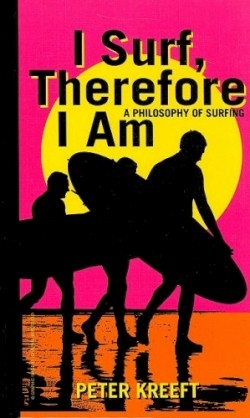I Surf, Therefore I Am
A Philosophy of Surfing
Like surfing, reading this book will make you happy. Kreeft, philosophy professor at Boston College and author of The Philosophy of Jesus and Socratic Logic, provides ten outstanding reasons to start surfing from ten illustrious sages, plus a manifesto supporting the right to boogie, and seven easy lessons for beginners.
Did I forget to mention that Kreeft is seventy years old and that he actually prefers to surf on the East Coast?
You may think that that reduces him to a surfing fanatic—and fanaticism is hardly a logical frame of mind, whereas philosophers are nothing if not logical. Be not afraid. As Kreeft assures readers, “No, surfers are not fanatics, because fanatics are not happy and surfers are.” Furthermore, “Fundamentalists believe the Rapture is future; surfers know it is present.” And finally, “The sea herself is the most poetic thing on earth (except perhaps for a woman’s face), and a breaking wave is the most poetic thing on the sea and riding it is the most poetic thing you can do with it. Therefore surfing is the most poetic thing you can do on earth.” As Kreeft reminds us, he’s written a book on Socratic logic, so he knows what he’s talking about.
But we haven’t gotten to the spiritual parts yet. Surfing, he says, makes one mystical because, “[w]hen you catch your first good wave, you will feel gratitude, because you will know that you have not chosen it, it has chosen you. You simply put yourself into the holy place where the gift was given.” You will also feel pity: “For that wave let you ride him at the last moment of his life, and his life was consummated for you. He died so that something in you could come to life in his death.” Finally, while the people of India may have discovered that yoga and meditation can result in Nirvana, the practice is difficult, nay, unachievable for most. Whereas in California, fifty years ago, George Morey invented the boogie board and made Nirvana available to everyone.
This little book is a treasure, and sure to interest not only surfers, but teenaged boys, idle in the academic stacks. I Surf, Therefore I Am is the second in a series about water, our love of the sea, and the metaphysics of surfing. The first book is called The Sea Within: Waves the Meaning of Everything, and next year St. Augustine’s will finish the trilogy with If Einstein Had Been a Surfer: A Surfer, a Scientist, and a Philosopher Discuss a “Universal Wave Theory“ or “Theory of Everything.“
Other Recommended Titles
In The Faith of Scientists (Princeton University Press, 978-0-691-13487-1), twenty-one scientists from the last 500 years discuss, in their own words, their views on God, religion, and spirituality. Gallileo points out to Cardinal Barberini at a dinner party that if misinterpretation can take place in science, how can it not also happen with the Bible. Pascal struggles with the notion that habit makes believers of us all. Sagan attempts to unite religion and science with his NOMA project. Steven Hawkings asks, “Why does the universe bother to exist? If you like, you can define God to be the answer to that question.” Compiled and edited by Nancy Frankenberry, the John Phillips Professor of Religion at Dartmouth College, The Faith of Scientists is a fascinating glimpse into the minds of men and women asking hard questions and struggling to find answers they can live with.
Richard Watson’s book, The Philosopher’s Diet: How to Lose Weight and Change the World (David R. Godine, 978-1-56792-084-0), was first published in 1986 and has been reprinted eleven times. That’s how good it is. If you’re ready to pull yourself up by the bootstraps and just get over those hurdles in life, then this is the book for you. “Fat,” he writes in the very first chapter. “I presume you want to get rid of it. Then quit eating so much.” Watson offers a striking mixture of serious and silly tips for accomplishing this. (“I mean, if you are not tough enough to go through the initial withdrawal symptoms, then buzz off.”) He also includes chapters on “Running,” “Sex,” and “How to Die,” for good measure. There is also a chapter called “How to Live,” but really, that is the subject of the entire book. And fat.
Even if you get nothing from it but a good laugh, fellow readers in the café won’t be able to resist the title.
Reviewed by
Heather Shaw
Disclosure: This article is not an endorsement, but a review. The publisher of this book provided free copies of the book to have their book reviewed by a professional reviewer. No fee was paid by the publisher for this review. Foreword Reviews only recommends books that we love. Foreword Magazine, Inc. is disclosing this in accordance with the Federal Trade Commission’s 16 CFR, Part 255.

